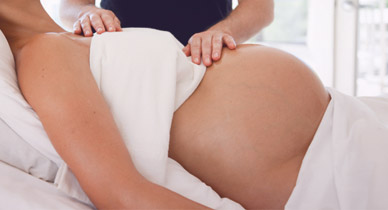If you are 34 weeks pelvic pain isn’t uncommon. Your baby is growing fast, and your uterus is at a state of rapid growth. However, there may be other signs with pelvic pain you need to watch out for at this time. Complications that cause pelvic pain can be treated to prevent early labor. Your doctor will be able to determine the source of this pain, and if it’s something to worry about.

Should I Worry about 34 Weeks Pregnant Pelvic Pain?
If you experience pelvic pain at 34 weeks, worrying is understandable. At this time, you do need to watch for signs of premature labor, or other complications. While pelvic pain can be a perfectly normal symptom, only your doctor can tell you if it is due to complications. Knowing some of the different causes will help you understand it better, and what to look for. Here are some causes:
Round Ligament Pain
Your baby and your uterus are going into the largest growth cycle over the next few weeks. Your baby is putting on weight for birth, and your uterus is holding a quickly growing human. This extra weight stretches and stresses the round ligaments that hold your uterus up. Most of your baby weight is now out in front of you and your muscles and ligaments are doing a contortion routine. This can be painful, leading to pelvic aches and pain.
Gas or Constipation
Your bowels are running out of room, and getting pushed all over the place to make room for baby. Your digestion is still running slow, and has to maneuver through some kinks on the way through. This can lead to two major sources of pelvic pain; constipation, and trapped gas bubbles.
Lightening “Baby Dropped”
During the next 4 to 6 weeks, your baby will be getting ready to get into position for birth. This means they flip head down, facing your back and “drop” into the lower part of your pelvis. When this occurs, even as early as 34 weeks, your pelvis will experience the extra weight and pressure. If your baby moves lower at 34 weeks pregnant pelvic pain may occur with long periods of standing, or activity.
Decreased Fluid Intake
If you are not drinking enough fluids, your uterine muscles may become irritated and start to contact. This may start out as dull pelvic pain, but if you don’t get fluids in your body, may turn into full contractions.
Premature Labor
You may already notice intermittent Braxton-Hicks contractions around this time. They come on occasionally and may cause a few cramps, then they taper off and go away. If you notice them getting stronger, and you have pelvic pain, you may be in premature labor. Most of the time, “false-labor” contractions go away with moving around. If walking makes the pain worse and contractions stronger, you need to contact the doctor.
Placental Abruption
This is a serious medical emergency. If you’re 34 weeks pregnant pelvic pain that is severe may be a sign that your placenta has separated from the uterine wall. It causes severe bleeding, and can be fatal to both you and your baby.
When to Call the Doctor
Your doctor may have already told you that you might experience mild cramps and pelvic pain in your third trimester. It’s hard to know what is normal, and what is not. Contact your doctor or go to your nearest emergency room if you experience the following signs:
- Your water breaks with a gush or leaking into your underwear
- You have bleeding
- You feel dizzy or like you are going to “pass-out”
- Fever over 100.4℉
- Strong steady contractions that don’t go away
- Your baby doesn’t move with pelvic or low back pain
- Pelvic pain that causes you to double over
- A sudden, sharp, stabbing pain
If you need to, call 9-1-1 and do not drive yourself to the emergency room if the pain or bleeding is severe.
What You Can Do About It
At 34 weeks pelvic pain should always be evaluated by your doctor first. If they have reassured you that your pelvic pain is nothing to worry about, here are a few things you can try at home:
Pelvic Rocks
Try getting down on the floor on all fours. Rock your pelvis up and down. This may help to reposition your baby and take some of the weight off your pelvis. You can do this throughout the day when you feel discomfort.
Warm Bath
As long as you have not lost your “mucus plug” you can try a warm bath to relieve muscle pain. If you have lost your mucus plug there is increased risk for infection, you can try a warm shower instead.
Birthing Ball
Birthing balls are a great way to help open up the pelvis and relieve pressure. Get an exercise ball according to your height and sit on it. Gently roll your pelvis from side-to-side, and back-and-forth.
Increase Fluids
You may just have an “irritable uterus” and need to increase your fluid intake. Try carrying a water bottle with you, and make sure the fluids you drink are caffeine-free. Caffeine can further dehydrate your body and make things worse.
Increase Fiber
If constipation and gas are the issue, increase the fiber in your diet to help get your bowels moving more smoothly. You can try things like raisins, apples, squash, high fiber cereals, and lentils. If those don’t work, ask your doctor about a fiber supplement. Try to avoid gassy foods like beans, onions peppers, and spicy foods.
Get a Pregnancy Massage
You may just need a good lower belly rub. Seek out a trained massage therapist that is licensed to do pregnancy massage. You can even have your partner gently massage your lower belly.
Now you know all about 34 weeks pregnant pelvic pain.

